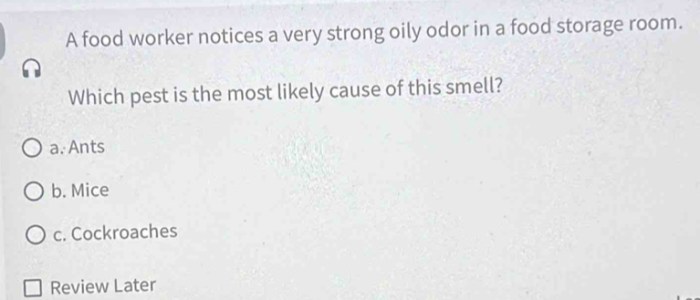When a food worker notices a very strong oily odor, it can be a cause for concern. This odor can indicate a variety of potential hazards, ranging from overheated oil to malfunctioning equipment. In this article, we will explore the potential causes of a strong oily odor in a food establishment and discuss strategies for mitigating the odor and preventing future occurrences.
The presence of a strong oily odor in a food establishment can be a sign of several underlying issues. One potential cause is overheated oil or grease. When oil is heated to a high temperature, it can begin to break down and release volatile organic compounds (VOCs) that produce an oily odor.
Another potential cause is spilled or leaked oil. If oil spills or leaks from cooking appliances or storage containers, it can create a strong odor that can permeate the establishment.
Odor Management in Food Establishments

Maintaining a clean and odor-free environment is essential for food safety and customer satisfaction. When a strong oily odor is detected in a food establishment, it is crucial to identify the source, assess the potential hazards, and implement mitigation strategies to ensure the safety of patrons and staff.
Odor Source Identification, A food worker notices a very strong oily odor
- Determine the specific location of the odor.
- Check cooking appliances, fryers, ovens, and other equipment for signs of overheating or malfunction.
- Inspect food storage areas, refrigerators, and freezers for spoiled or improperly stored items.
Odor Assessment
Describe the intensity and characteristics of the odor. Note any unusual smells, such as burning, rancidity, or chemical fumes. Determine if the odor is localized or pervasive throughout the establishment.
Potential Causes
Possible sources of the oily odor include:
- Overheated oil or grease
- Spilled or leaked oil
- Improperly stored or disposed of food items
- Malfunctioning equipment or appliances
Safety Considerations
Assess the potential hazards associated with the odor. Determine if the odor poses a risk to health or safety, such as respiratory irritation or fire hazards. Implement appropriate safety measures, such as ventilation or evacuation, if necessary.
Mitigation Strategies
To mitigate the odor, consider the following strategies:
- Clean and deodorize affected areas using appropriate cleaning agents.
- Repair or replace malfunctioning equipment or appliances.
- Properly store and dispose of food items to prevent spoilage and odor.
Reporting and Documentation
Report the odor to supervisors or managers promptly. Create a detailed record of the incident, including the date, time, location, and actions taken. Maintain documentation for future reference or investigation.
Expert Answers: A Food Worker Notices A Very Strong Oily Odor
What are some potential causes of a strong oily odor in a food establishment?
Potential causes include overheated oil, spilled or leaked oil, improperly stored food items, and malfunctioning equipment.
What are some strategies for mitigating a strong oily odor in a food establishment?
Strategies include cleaning and deodorizing affected areas, using ventilation to remove odors, and implementing preventive measures to prevent future occurrences.
What are some preventive measures that can be taken to prevent a strong oily odor in a food establishment?
Preventive measures include properly storing and disposing of food items, regularly cleaning and maintaining cooking appliances and equipment, and training staff on proper food handling and safety procedures.

